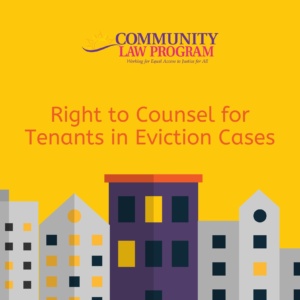Right to Counsel for Tenants in Eviction Cases

Should tenants have the right to court appointed counsel in eviction cases? Some jurisdictions across the country say yes. New York City, San Francisco, and Cleveland, among others, enacted legislation to provide indigent tenants with attorneys in these cases. The Voices for Civil Justice compiles news articles about this (and other) topic on their website at https://voicesforciviljustice.org/pub/27814/is-tenants-right-to-counsel-on-its-way-to-becoming-standard-practice/. More cities are examining this option and momentum may be building.
In Florida, we have the right to court appointed counsel in most criminal cases. As for civil matters, the right to counsel exists for parents in dependency, involuntary commitments, and a limited number of other cases. Justice Black wrote of the government “machinery used to try defendants accused of crime” in Gideon v. Wainwright, 372 U.S. 335 (1963), a landmark case on right to counsel for indigent defendants in criminal cases. He also emphasized that:
From the very beginning, our state and national constitutions and laws have laid great emphasis on procedural and substantive safeguards designed to assure fair trials before impartial tribunals in which every defendant stands equal before the law. This noble ideal cannot be realized if the poor man charged with crime has to face his accusers without a lawyer to assist him.
Of course, there is a distinction between the state action of prosecuting someone in a criminal case or removing a child from parents and a private eviction cause of action. Right? What if the landlord is a public housing agency? What if large private, corporate landlords organize to lobby elected officials regarding landlord/tenant law? What if the landlord is an individual that supplements their modest retirement income by renting out half of the duplex in which they also live?
Should we examine the machinery of Chapter 83? Do we have procedural and substantive safeguards for all parties in place in eviction actions? Could the right to counsel help with the housing crisis? Help families avoid poverty? Do we try to make the “game” more fair by adding more skilled players? Or do we look at the underlying rules and address any inequities? Both? Of course we know that eviction is not a game. It’s a process that has life altering consequences, often for those that have little to no safety net.
Big questions for the first Monday of 2020.
Community Law Program’s housing clinic is the first and third Friday of each month. If you’re a Pinellas County resident with housing questions call 727-582-7480 to complete an intake. If you’re an attorney that wants to volunteer, call the same to sign up for one of our advice clinics or to provide direct representation to a member of your community.
